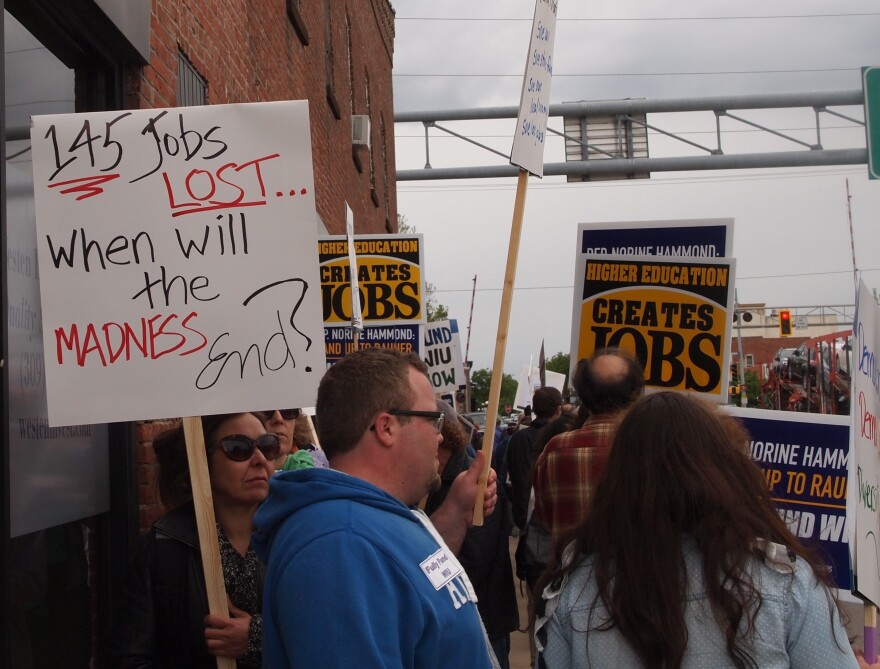Even though the school year is over at Western Illinois University, the Macomb community is still rallying for higher education funding. About 50 people -- including Western faculty, staff and a few students -- gathered alongside members of the community for a demonstration that started in Chandler Park.
Some shared how the funding cuts at Western are impacting them. In some cases that involved being laid off, taking early retirement or a drop in business for those community business owners.
The community is still waiting to hear if higher education will receive any more state aid this fiscal year with just a few weeks left in the legislative session.
So far, lawmakers have only released about 30% of Western’s and most other public universities appropriations as part of a stop gap measure to keep the schools open through the summer.
Marjorie Allison, an English Professor at Western, said 30% is not enough.
“I’ve been at WIU since 1994 and I’ve never seen the campus as demoralized. People losing their jobs, no funding, things as simple as floors being waxed, carpet can’t be cleaned, and yet we are going to be bringing students and trying to convince them to go to school here… and it’s just insane,” Allison said.

Allison carried a sign that read “Representative Norine Hammond / stand up to Rauner / fully fund WIU.” It was of many yard signs and poster boards given out by event organizers as the group mobilized to march from Chandler Park to State Representative Norine Hammond’s Macomb office on N. Lafayette St.
The demonstrators marched back and forth along the side walk as they chanted and demanded full funding for Western.
The event drew more than just locals. A group of faculty members from Northeastern Illinois University rode the train down for the day. Among them was Sophia Mihic who teaches philosophy and political science.
“This is really a problem for the whole state and I can’t separate northeastern and Chicago state university from Western,” Mihic said.
She said a lack of state aid means college students are worried about getting MAP grants and being able to graduate or they are choosing out of state schools. She said not receiving state aid can also impact the public colleges’ accreditation. She said similar movements are underway at Northeastern.
Bill Thompson, President of the University Professionals of Illinois chapter at WIU, said the rally was held to encourage Hammond to vote in support of her community and against the interests of Governor Bruce Rauner and the Republican Party.
“Voting with the Governor is going to hurt WIU. Every budget he has proposed has been harmful to WIU and Norine [Hammond] has often voted present or even with the Governor until this very last one-third of our budget or 70% cut is the other way to look at that,” Thompson said.

Volunteers will also be going door to door throughout the community to gather petition signatures to present to Hammond asking for her to support full funding of Western.
Thompson said the effort is not about politics or the fact that it’s an election year and Hammond drew a Democratic opponent, John Curtis of Macomb.
The demonstrators’ voices could be heard inside Hammond’s office but the lawmaker was not there during the rally. She had appointments in the southern part of her district as she made her way to Springfield for another week of the legislative session.
Hammond said she talked to rally organizers beforehand and told them to get their petitions to her as soon as possible so she could hand-deliver them to legislative leaders and the governor.
Hammond is part of a bipartisan, bicameral group of lawmakers, the Budget Working Group, that’s drafting state budget proposals for the current fiscal year and for next year. She said the group’s proposal would impose “minimal cuts” on all departments and agencies in the state, though she said group members are not yet prepared to publicly reveal details. Hammond also said the group is still working on revenue options.
“Everything is on the table at this point. Absolutely everything,” she said.
Hammond said she raised her family in Macomb and her daughter attended WIU so she has a vested interest in preserving Western and public higher education throughout Illinois. She called higher education the pathway to a better economy.
And she said she feels optimistic about the Budget Working Group’s efforts.
“We’ve been working and getting along and our meetings have been very good and productive,” she said, though she acknowledged there is still work to be done before the Legislature’s scheduled adjournment date of May 31.
“I’m hopeful that common sense and cooler heads are going to prevail in the coming weeks.”

An agreement can’t come soon enough for Katie Van Sloten of Macomb, who owns the small, pet-sitting business Walks with Kate. She told demonstrators that her business quickly became successful when it started three years ago. But she’s seen business decline in the past year as some WIU employees participated in an early retirement program, other workers were laid off, some received furloughs, and the university left open vacant positions. “I have gone from eight to ten appointments a day down to five or six, and with this last round of layoffs I have only two appointments on my calendar for June,” Van Sloten said.
“I’m looking at my business and not knowing if it’s going to be around this time next year.”
In addition, her husband is required to take furlough days from his job at the university, further cutting into their family’s income.












